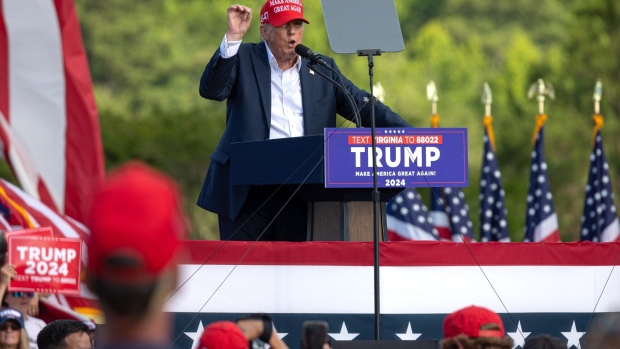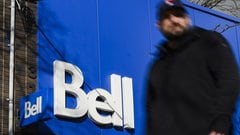Jul 1, 2024
Trump Seeks to Toss NY Felony Conviction After Immunity Win
, Bloomberg News

(Bloomberg) -- Donald Trump is making a new push to get his New York hush-money conviction tossed out after the US Supreme Court ruled that he has at least some immunity from criminal prosecution for official actions he took while president.
The former president’s lawyers on Monday took preliminary steps to request that a New York judge set aside the jury’s verdict against him, according to a person familiar with the situation who declined to be identified discussing nonpublic matters.
In a letter to the judge, Juan Merchan, they also propose delaying his July 11 sentencing to allow time for briefing and arguments. In the letter, which won’t be made public until at least Tuesday, they ask for permission to formally argue that the conviction should be overturned.
A spokeswoman for Manhattan District Attorney Alvin Bragg, who prosecuted the case, declined to comment. A spokesperson for Trump didn’t immediately return a request for comment. The letter was first reported by the New York Times.
6-3 Decision
Earlier on Monday, in a 6-3 decision, the high court held that former presidents are shielded from prosecution for an array of official acts. The opinion reversed lower-court rulings that had rejected Trump’s claim of absolute immunity against federal charges related to his efforts to overturn the 2020 election results.
The majority sent the case back to a federal judge in Washington to oversee another round of legal wrangling over what exactly could survive in the federal indictment.
It’s unclear if Trump will succeed in his bid to overturn his New York conviction. Two judges have already rejected his immunity claims, although both were made before the Supreme Court issued its decision.
But as the latest activity in New York showed, the decision is expected to have ripple effects in the other criminal cases pending against the former president.
In addition to the federal election prosecution in Washington and the New York hush money case, Trump is facing state charges in Georgia related to the 2020 election and federal charges in Florida accusing him of unlawfully holding on to classified information after leaving the White House and attempting to obstruct that investigation.
A lawyer for Trump in the Georgia case declined to comment on what the defense’s next steps following the Supreme Court’s decision. The case is already on hold while an appeals court considers Trump’s bid to disqualify the prosecutor leading it, Fulton County District Attorney Fani Willis.
‘Official Acts’
In New York, Trump intends to argue that key elements of the hush-money case are related to events that took place while he was president, even though the case is rooted in his actions as a candidate for the White House in 2016.
Jurors heard testimony and saw documents that could be evidence of “official acts” and might be barred under the Supreme Court ruling. They include Trump’s social media posts and public statements while in office; testimony by former White House officials Hope Hicks and Madeleine Westerhout; phones records involving Trump as president; and a financial disclosure form he filed in May 2018.
Trump was convicted by a state jury in Manhattan in May of 34 counts of falsifying business records after he directed his former lawyer Michael Cohen to pay $130,000 to adult-film star Stormy Daniels before the 2016 election. He could face as many as four years in prison.
Prosecutors argued Trump reimbursed Cohen for the hush-money scheme with several payments recorded as “legal services” in company books. Testimony showed Trump later signed some reimbursement checks while he was in the White House in 2017. The jury rejected Trump’s claims the money was for actual legal work.
Last year, US District Judge Alvin Hellerstein in New York rejected Trump’s claim he had immunity from prosecution after presiding over the former president’s bid to move the hush-money case to federal court.
Personal Lawyer
Trump argued to Hellerstein that his federal immunity was based on his decision to retain Cohen as his personal lawyer after he was elected president. But Hellerstein concluded Trump’s lawyers failed to show that the behavior at issue — reimbursements to Cohen to keep Daniels silent — was somehow related to the office of the presidency.
Hellerstein wrote that the evidence overwhelmingly suggested the case involved something personal to the president: “a cover-up of an embarrassing event.”
“Hush money paid to an adult film star is not related to a president’s official acts,” Hellerstein said. “It does not reflect in any way the color of the president’s official duties.”
In March, Merchan rejected Trump’s argument he was immune from prosecution. He concluded that the former president’s request was “untimely” because he waited nearly six months, until just days before the trial was set to begin, to raise that argument, even though he’d made that same immunity claim in the Jan. 6 case before US District Judge Tanya Chutkan in DC.
Just before trial, Judge Merchan denied Trump’s request to delay it until after the Supreme Court ruled on his presidential immunity claim. It’s unclear if the Supreme Court’s decision can help the former president challenge his conviction since the deadline to file post-trial rulings expired last month without any filings from Trump. Merchan could reconsider or suggest that Trump make it part of his appeal.
--With assistance from David Voreacos and Erik Larson.
(Updates with possible official acts in the hush-money trial)
©2024 Bloomberg L.P.








